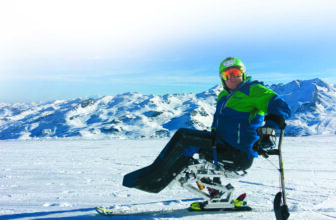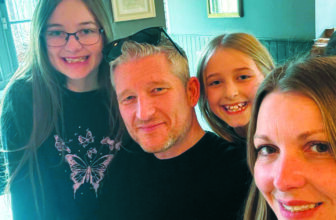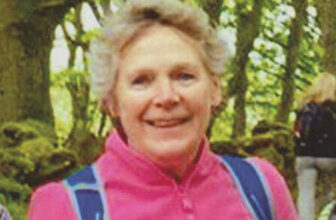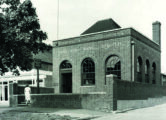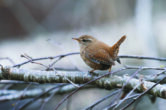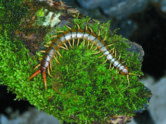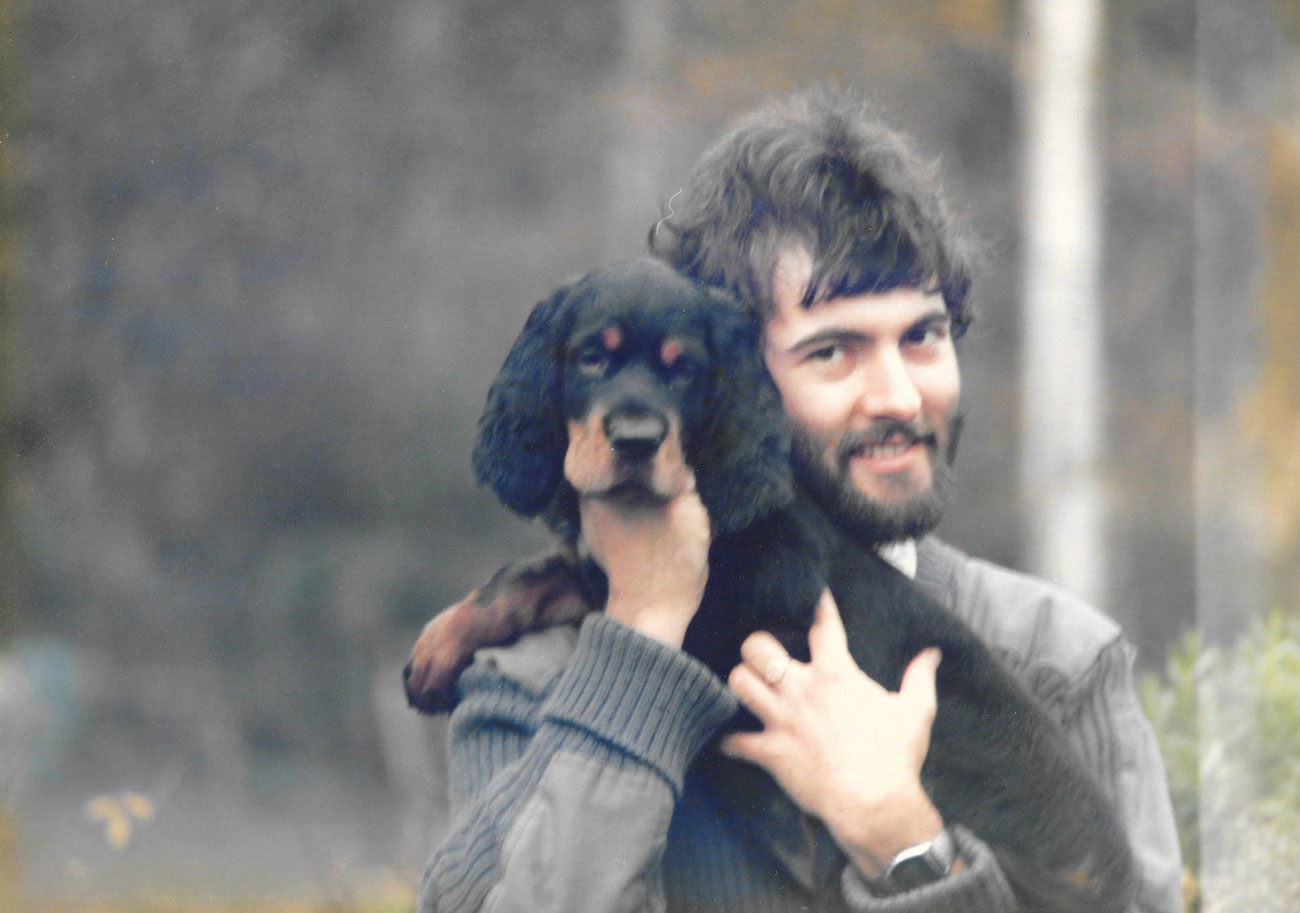
Early days with my Gordon Setter puppy
I was born in Woolwich and brought up in Joydens Wood – a village close to Dartford in Kent (which makes it sound a lot more rural than it was). The village was named after a local woodland, about 360 acres in size, where my childhood friends and I spent much of our time.
My dad was an electrical engineer. One of the companies he worked for installed control equipment in power stations, and one of my early memories is helping my mum print out copies of the manuals on an ancient Gestetner copier. Dad later went into higher education, teaching electronics and computing at Lewisham Technical College. Mum originally worked in the pathology lab at the Royal Dental Hospital. She left work to bring up my sister and me, but later returned to work as a weekend casualty receptionist at a local hospital. A great advantage of dad working in education was that we were able to take long summer holidays. We bought a trailer tent and would go camping, usually in Scotland, for about a month in the school Summer holiday. I still remember the relief when we bought an annexe for the trailer tent, as four of us and a large dog were rather cramped in the basic tent, especially given the usual weather conditions in the North. The West Coast of Scotland and Cairngorms are still my favourite places in the world.
I was very fortunate to have been educated in an old-fashioned grammar school – Dartford Grammar. It was a school which valued learning above all else, so my total lack of interest or talent in sport proved no problem at all. I especially loved science, particularly physics, and there were many opportunities to pursue that interest. My other main passion has always been music. I started learning piano at age 7, then at 12 took up tenor saxophone. At one point during my school years I was playing sax in four bands each week, plus singing in the school choir and playing percussion in the local youth orchestra. My parents loved classical music, big bands and trad jazz so in my early years I heard very little else. I “discovered” rock in my mid-teens, and folk, blues and world music at university and now have a very eclectic taste (though most chart music leaves me cold).
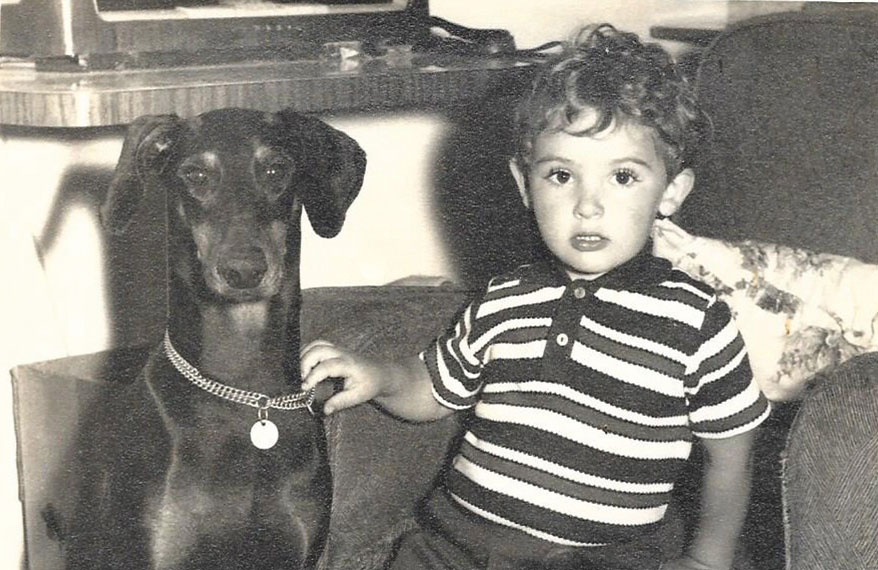
Me and my first ‘best friend’, a dog
I wanted to be a vet as far back as I can remember. My parents got their first dog – a Doberman Pinscher (my godmother used to breed them) – a few months before I was born so I have been around animals my whole life.
When I was very young, we were walking the dog at the top of a cliff. She heard my father on the beach below and took the direct route down to see him. She was badly shaken but, fortunately, not injured. I think that may have been the first time I realised that animals need doctors too. Another event that influenced me occurred in my early teens. We had just acquired our first Gordon Setter pup, and she fell into a ditch and broke her elbow.
The vets did a great job but the pain relief in those days was rather rudimentary and she was very uncomfortable. Her breeder was a great friend of George Macleod, the father of veterinary homeopathy in the UK, and she sent us a homeopathic remedy for her. The effect was like flicking a switch – she went from a crying, whimpering mess to a happy, bouncy pup (a bit too bouncy actually) in a few minutes. This sparked a lifelong interest in complementary medicine.
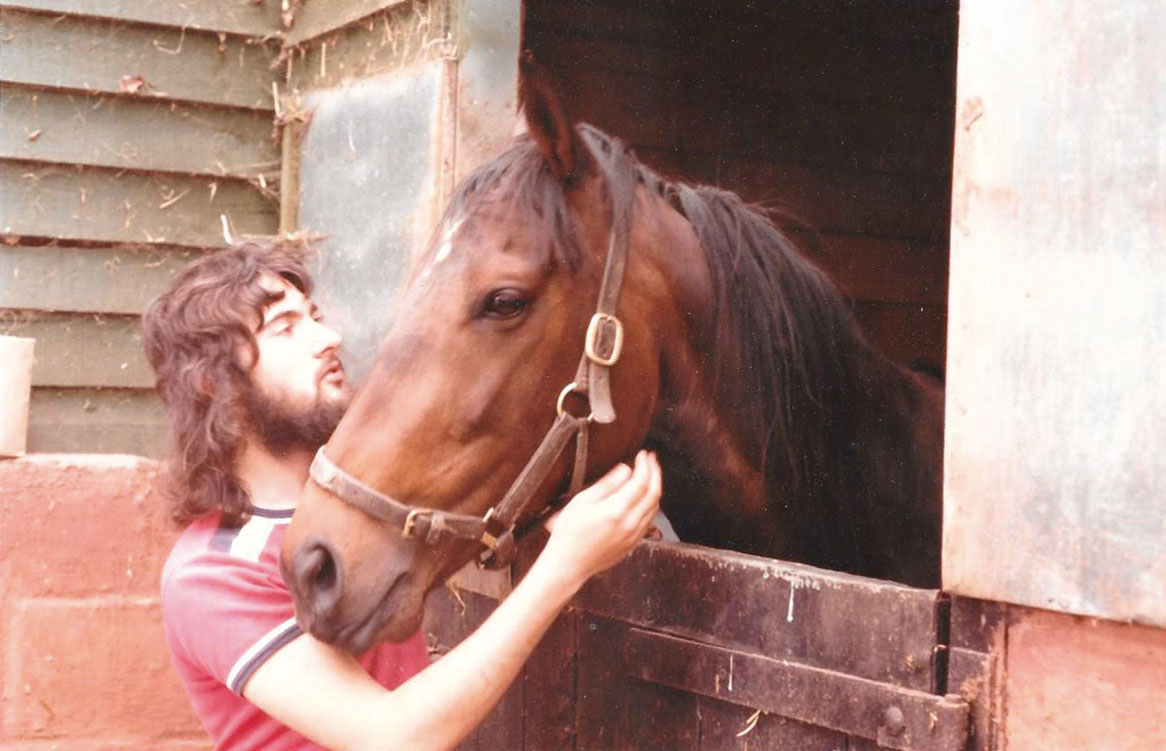
I have loved horses from a very young age
A very fond memory from my teenage years was my work experience. I had been told that some farming experience would be helpful towards my application to Vet School. My parents found a council-run farm near Dartford, which was used for educational visits, and had a variety of animals. I spent three weeks there, learning which end bites and which end kicks! The person in charge was a heavy horse enthusiast, and we spent whole days walking behind a plough or harrow, pulled by his two beautiful shires. The older was a rather bad-tempered stallion. These were the days when Barbara Woodhouse’s animal training TV programs were popular – her big advice was “to befriend any animal, breathe up its nose.” The first thing I was told when introduced to the horse was “breathe up his nose and he’ll bite your face off.”
I trained at Bristol University. The course was five years long, but felt like it was five months as I enjoyed every minute. The veterinary course is organised such that students do all the theory and practical teaching during the university terms, and then spend most of the holidays doing practical experience. This means that there is very little opportunity to earn extra money, especially in the later parts. I was very lucky that I trained in the days when grants were available. I feel very sorry for today’s vet students, most of whom graduate with loans over £80,000.
My first job was in Ipswich. The practice had recently opened a new part-time branch and I was given almost sole manning of it. This gave me great experience. I joined the practice determined to either be an orthopaedic surgeon or a farm vet. I soon realised that they were the two sides I enjoyed least (though there are few things more satisfying than a successful calving, even at 3am). My true passions lay with small animal and horse work. The senior partner owned Chris Day’s book on veterinary homeopathy, which I borrowed, followed up the ‘useful contacts’ and became a member of the British Association of Homeopathic Veterinary Surgeons. I bought a few remedies for my consulting room shelf and was astonished how many clients knew what they were and how to use them. Once they realised I was open to and interested in complementary therapies they started to tell me about all the other modalities they were using and over the years I have learned a tremendous amount from clients.
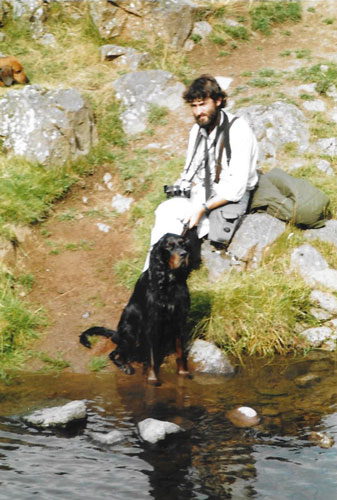
Me and my Gordon Setter enjoying the outdoors
I moved to Cranleigh in March 1989. At the time the practice (then called Berry and Harrison) was very mixed. We had a good dozen reasonable-sized dairy farms and several beef units plus a number of stables on the books. Sadly, very few of the farms are still working and, as many specialist horse vets have since set up in the area, we decided to refer our horse work to them and concentrate entirely on small animals. In Cranleigh, I was quickly recognised as I spent most of my non-working time walking my huge, friendly Gordon Setter whom I acquired whilst in Ipswich. People who didn’t know my name would ring the practice and ask for “the vet with the dog.” My receptionists often delight in telling me how clients have described me on the phone – I have had “the vet who talks to the animals in a funny voice”; “the one who plays with the dogs” ; and (perhaps my favourite) “the one who looks like a gypsy violinist” (I had more hair in those days!)
I met my wife quite literally over the garden fence – she was lodging with my neighbour (another assistant at the practice). We married in 1993, and have been blessed with three fabulous sons, none of whom wanted to be vets, but have all followed my passion for music. It was thanks to my wife that I became a Beaver Scout leader, which I did for thirteen years. Through my wife I also started attending Cranleigh Baptist Church. I was delighted to find a group of people who didn’t mind all my awkward questions. The then assistant minister, Terry Miller, quickly discovered my love of books and provided me with piles of them to read. Many of my clients remind me of times they met me out walking, the dog in one hand and a book in the other, not at all looking where I was going. I became a Christian and was baptised in 1998, the year after qualifying as a veterinary homeopath.
In Homeopathy, a remedy is chosen which would produce the same symptoms in a healthy patient, treating like with like. All the tests have been done on humans so translating to animals isn’t always easy. Homeopathy works differently from conventional drugs. In conventional medicine you are giving a chemical that has a particular effect in the body, so if you’ve got inflammation, you’re using something that blocks the inflammatory pathways. With Homeopathy, the idea is that you’re trying to re-educate the body’s immune system to sort itself out. Homeopathic remedies are prescribed on the details of how a disease affects the individual animal so, for example, it would make a difference what time of day or in what weather conditions the animal feels worse. It is a controversial therapy because the remedies are very highly diluted, past the point where there is any of the original substance left. At the moment we have no idea how it works. In addition the testing methods used for conventional medicine are inappropriate for homeopathics, so there is little scientifically accepted evidence for their action. Despite this, people have been using it successfully for over two hundred years.
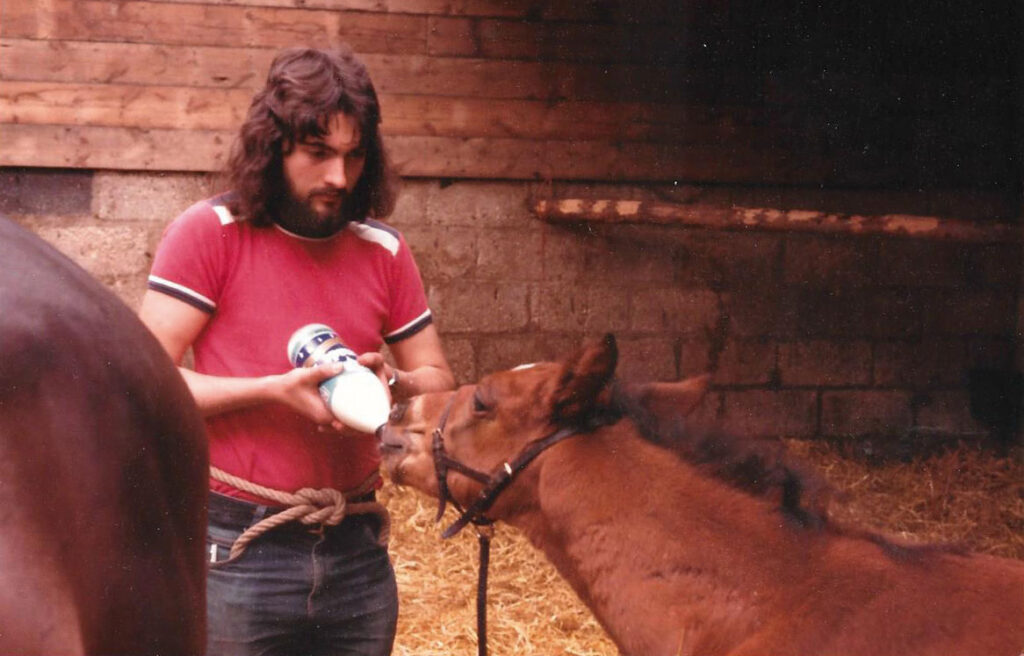
Feeding time for a young colt
I certainly don’t use homeopathy exclusively, most of my work is conventional medicine, but it can sometimes come in very handy. There are an awful lot of people who would rather try homeopathy first rather than dive straight in with conventional drugs, and we have had some very spectacular successes with it.
I draw my inspiration and motivation from my patients and clients. I love being part of those relationships and being trusted to help when problems arise. Some clients despair of me – they come in telling me terrible things their pet has done and I laugh, “He’s a dog/cat, what do you expect?”
One crucial aspect of my relationship with a client’s pet is their end of life. It is obviously an emotional time, and has to be handled sensitively. People often say it must be the worst aspect of my job but I feel it is a privilege. There comes a time when a patient is obviously coming to the end, not enjoying a quality of life and there is nothing more that can be done to improve that time. Being able to provide a quick, gentle, painless way to help them on their way can be a great gift. I can’t say I enjoy it but I’m very thankful that we can do it and I am a passionate advocate for legalisation of assisted dying for people. As a vet you can make a patient’s passing a very calm, peaceful process and most people are profoundly grateful for that.
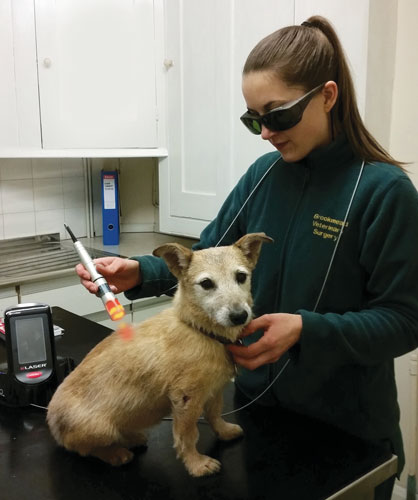
A dog receiving K-Laser treatment at Brookmead
I’ve often had people seeking advice about being a vet. The best way to get a place at vet school is to show that you know what you’re getting into. Spend time with a vet and, more importantly, get some work experience with large animals on farms and stables. You need to get used to being covered in poo from head to toe. It’s also pretty important to find an understanding partner who doesn’t mind you turning up freezing cold and stinking at 3am!
Coping with the job of being a vet nowadays is somewhat more straightforward than earlier in my career as out of hours work is now largely covered by specialist centres. I think if we still worked those long hours I wouldn’t be able to do the job anymore. I’ve often joked with students that you basically have to learn to live on a diet of sugar, caffeine and no sleep. Not only do you have to like animals, you have to like people and have an understanding of their opinions and anxieties. You definitely can’t be a perfectionist, because in medicine things will go wrong. It’s inevitable. It is essential to learn from the good and the bad, but then it’s essential to move on. Dwelling on problems doesn’t do anyone any good, and the good times far outweigh the bad.
Burnout in our profession is an appalling problem, as is suicide, our profession having one of the highest incidences for it. I believe the high suicide rate is because a veterinary career is very demanding. It’s emotionally charged, most of the time in a good way. It’s a very satisfying job but the buck stops with you. When things go wrong there’s a tendency to blame yourself. We always try our very best to help people and sometimes the job follows you out of the office. I am only now learning to leave the job behind when I leave the practice but it’s taken about 30 years!
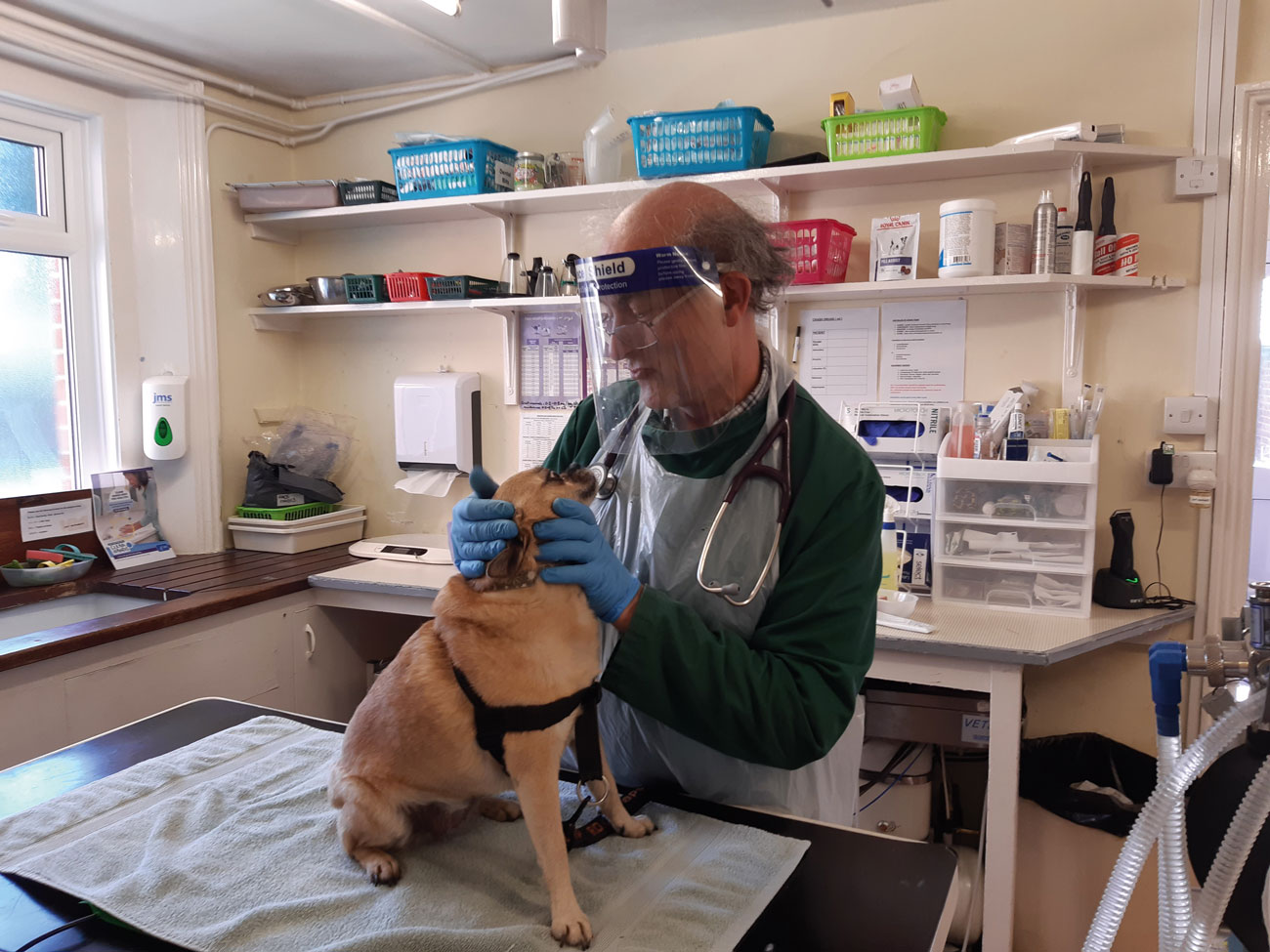
The best job in the world . . . working with my patients
Thinking of demanding circumstances, I have had a number of strange cases over the years. I remember once having to remove a tumour from a koi carp’s head. I was trying to keep the op site sterile whilst the fish’s owner was continually squirting pond water over the gills so the fish could breathe. Many problems stem from the interesting things some animals try to eat. I have removed all sorts of foreign bodies from pets intestines, including a six-foot long scarf and an intact cassette tape. I once had a large dog who had been playing with his ball. The ball had a bell in it and there was a hole so you could hear the bell. The dog had managed to get his entire tongue jammed through the hole, and was in a terrible panic. Fortunately with sedation and lots of lubricant we got the tongue out, bruised but with no long-term damage. He was never allowed to play with that ball again!
I thoroughly enjoy the teaching side of veterinary work. For many years I have been responsible for much of the nurse training at the practice and we regularly have student vets shadow us during the holidays. This also helps us keep up to date with the latest thinking. My advice to anyone is always keep learning. Take every opportunity to learn something new, whatever it may be, whether you think you’ll be interested or not. Jump at the chance to take on something new each day.
In my experience being a vet has been a fantastic profession, you literally don’t know from one minute to the next what’s going to happen, and that makes it exciting! I love ‘talking animals’ with owners. Getting to know the animals with all their individual personalities and following them throughout their lives is what appeals to me most. Animals are such true, faithful companions.
For more information contact:
info@brookmeadvets.com
www.brookmead-vets.co.uk
Facebook – Brookmead Veterinary Surgery
01483 274242



